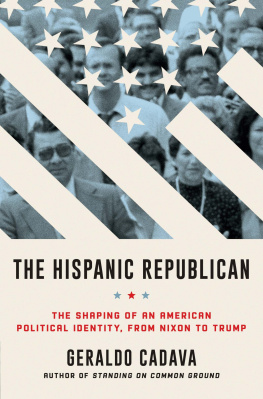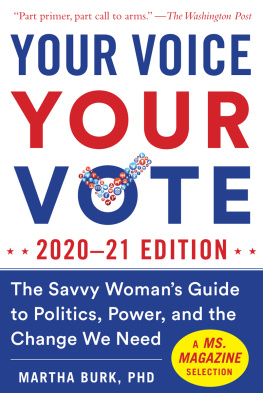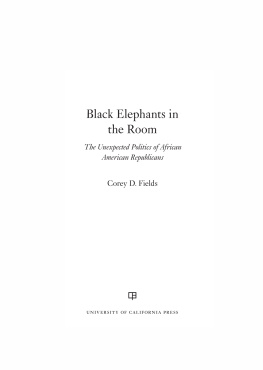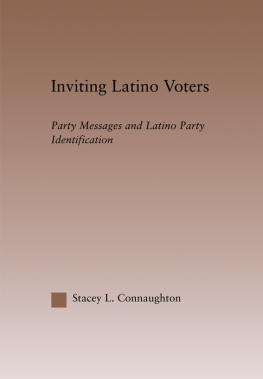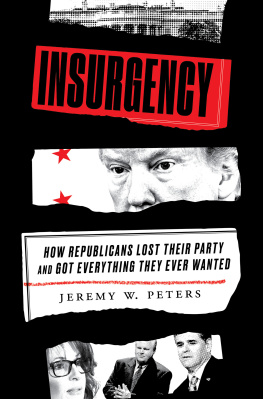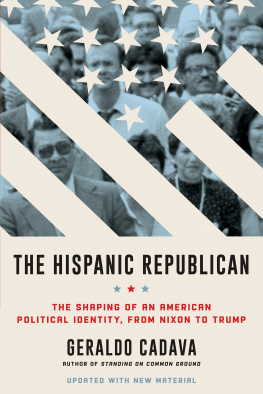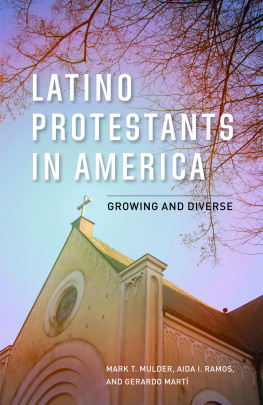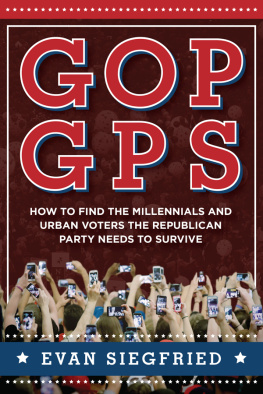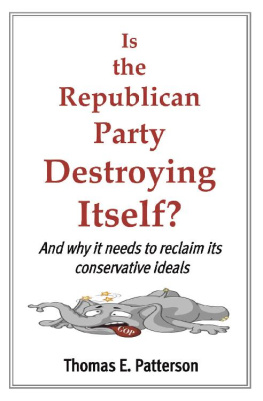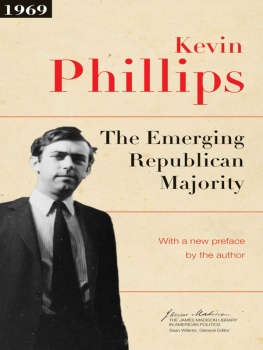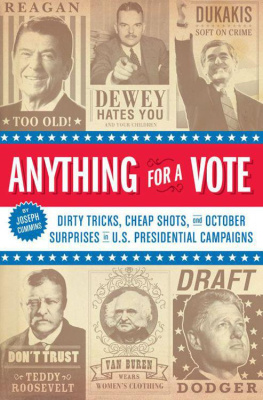If you held American currency in the seventies and eighties, odds are you carried with you the autograph of one or more Mexican American treasurers of the United States. There were three of themall women, all Republicans. Romana Acosta Bauelos was from California and served under President Richard Nixon. Katherine Ortega was from New Mexico and served under Presidents Ronald Reagan and George H. W. Bush. And Catalina Vsquez Villalpando was from Texas and succeeded Ortega in the Bush administration. By the late twentieth century, it had become a tradition for Republican presidents to tap Hispanic women for the post. Their appointments were supposed to symbolize the greater inclusion of Hispanicsthe ethnic label preferred by most Hispanic Republicanswithin the Republican Party.
Romana Acosta Bauelos. Katherine Ortega. Catalina Vsquez Villalpando. These arent household names, even though their printed names were in every household in America for years. They remain largely unknown in the annals of American and Latino history, even though they were prominent political figures who helped elect Republican presidents, and helped build a Hispanic Republican base that plays an important role in politics today. These Hispanic Republicans are even alien to some fellow Latinos, who continue to insist that theyre sellouts, race traitors, pochos (fruits that have lost their color), or tio tacos (Hispanic Uncle Toms). Students in my Latino history classes have questioned whether Hispanic Republicans should be considered Latino at all, as though the label itself implies a particular political identity.
Hispanic Republicans too often get secreted away in the archive of our family histories. Some Latinos roll their eyes as they explain how their conservative kin arent pleasant to be around because they express their views too freely, complaining about illegal immigration, high taxes, and welfare, even if they were immigrants who at some point benefited from government services. The Hispanic Republicans in our own families demonstrate our closeness, our intimacy with them, and how weas Latinos, as Americans, as Latino Americanswrestle with the diversity of viewpoints in our communities.
Indeed, millions of Hispanic Republicans have been a part of the Hispanic community for a long time. Before the 1930s, most Hispanics, like most African Americans, were Republicans. Only afterward did the Hispanic Republican come to seem like a paradox. Between the 1930s and the 1960s, most Hispanics became Democrats, primarily, they said, because Franklin Roosevelt and the New Deal helped lift them out of the Depression. But then something interesting happened. Beginning in the late 1960s, and especially in the early 1970s, as African Americans continued their flight from the Republican Party, the percentage of Hispanics who voted for Republicans shot up. A graph comparing Hispanic and African American support for the Republican Party over the past half century would look like an X, with Hispanic support rising and African American support falling, and for intertwined reasons. Recognizing that they were losing African American votes, Republicans had to find support among new voters, especially Hispanics. Their numbers were small at first, too small to make a real difference. But as the Hispanic population grew, Hispanics began to influence elections, and politicians in both parties took notice.
Ever since Nixons reelection in 1972, Hispanic Republicans have helped Republican presidential candidates win about a third of the Hispanic vote. The exact number has been a little less or a little more, depending on a range of factors including the brand of the Democratic or Republican Party at a particular moment, the excitement or distaste Hispanic voters have for a particular candidate, the Hispanic rate of participation in a given election, and local, national, and world events. This consistencythe usual third, give or takeis especially remarkable given the variance in how Latinos and Latino voters have been counted. Only two Republican candidates dipped below 20 percent: Gerald Ford in 1976 and Bob Dole in 1996. Both lost, but even they did better than all Republicans before 1972. George W. Bush won some 40 percent of the Hispanic vote in 2000, and 44 percent in 2004. When he was president, Hispanic Republicans believed that a majority of Hispanics might vote for a Republican someday.
Hispanics even contributed to Donald Trumps surprise victory. In their 2014 book, two political scientists offered this prediction: Both of us have a very difficult time seeing a Democrat lose the race for the White House in 2016, in part because of the impact they expected Latino voters to have. (Like them and others, I would have made the same prediction at that time.) But of course the Democrat did lose, and the Republican candidate won with just shy of 30 percent of the Hispanic vote, even though he launched his campaign with a tirade against Mexican immigrants. Trumps remarks were widely rebuked, making it seem unlikely that any Hispanic would support him. Yet they did, and by a slightly wider margin than the percentage of Hispanics who voted for establishment candidates such as John McCain in 2008 and Mitt Romney in 2012.
Since Trumps election, some evidence suggests that the Republican Party, and even the president himself, has gainednot lostsupport among Hispanics, who, like many Americans, have been politically energized. The National Association of Latino Elected and Appointed Officials (NALEO) found that Hispanic voter turnout in the 2018 midterm elections was 50 percent higher than in 2014. Political analysts generally agreed that the Hispanic voter surge favored Democrats, but in congressional races nationwide, the usual third of Hispanics voted for Republicans. In important races in Texas and Floridatwo bellwether states we often look to in order to predict whether liberalism or conservatism are on the rise nationallyRepublican candidates did better than that. Ted Cruz did a little better, winning 35 percent of the Hispanic vote in his race against Beto ORourke. Rick Scott did a lot better, winning 45 percent of the Hispanic vote in his race against Bill Nelson.
Perhaps its easier for Republican candidates to find success locally, where they can have more direct and sustained contact with voters and sometimes distance themselves from national leaders. But Trump himself has also found support among Hispanics. One poll taken in early 2019, during the government shutdown, showed that more than half of Hispanics would definitely vote against him in 2020. More surprising was the polls finding that he had a 50 percent approval rating among Hispanics, a full 19 percent higher than when he took office. Thank you, Trump tweeted, working hard! To be sure, several polls taken since have shown Trumps approval among Latinos to be far lower, and even this one poll was disputed at the time. But it was still a marker of how Latino opinions of the president are diverse and have varied.
Trumps Hispanic supporters note that the unemployment rate is low, tax cuts have benefited them, and financial regulations have been slashed. They claim that socialism from Venezuela to the US Congress threatens freedom. These themes were repeated over and over again at a gathering of small-business owners in Washington, DC, where Cruz, Scott, and Mike Pence were featured speakers. Meanwhile, the border wall, family separations, and the Russia investigation didnt come upthe impeachment proceedings against Trump hadnt yet begun. Even after the devastating El Paso shooting in August 2019, which left twenty-two people dead and was widely regarded as an attack against Mexican immigrants and Hispanics that was brought on by Trumps rhetoric, Hispanic Republicans blamed only the shooter, not the president.

